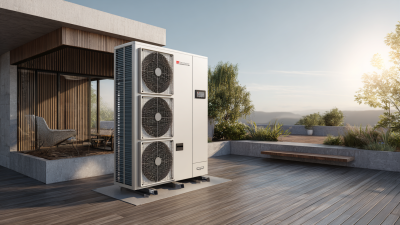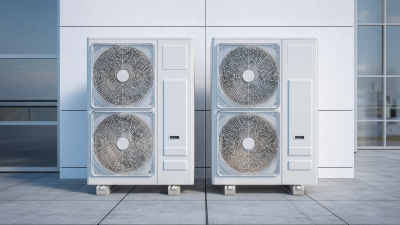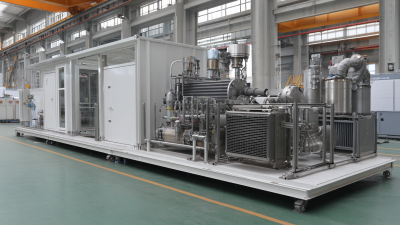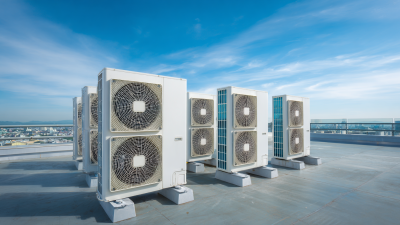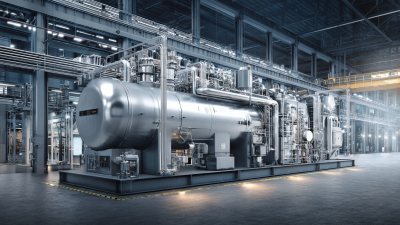Leave Your Message
In today's fast-paced world, finding ways to maximize efficiency in our homes is more important than ever, especially when it comes to heating systems. One of the most effective solutions available is the Heat Pump Heater, which not only provides reliable warmth but also does so in an energy-efficient manner. As energy costs continue to rise, homeowners are seeking smarter ways to heat their spaces without sacrificing comfort. This ultimate guide will delve into the various strategies and tips to enhance the efficiency of your Heat Pump Heater, helping you save money and reduce your carbon footprint.

Whether you're considering installing a new system or looking to optimize your existing one, you'll find valuable insights that will empower you to make informed decisions and achieve the best performance from your heating solution.
When selecting a heat pump heater, understanding efficiency ratings is crucial for optimizing performance and energy savings. These ratings, typically represented by the Coefficient of Performance (COP) or Heating Season Performance Factor (HSPF), quantify how effectively the heater converts electricity into heat. A higher COP indicates that the unit is more efficient, providing more heating output for each unit of energy consumed. By focusing on these ratings, homeowners can make informed decisions that reduce energy consumption and lower utility bills.
Moreover, it's essential to consider how external factors impact efficiency. Climate conditions, installation quality, and the system's compatibility with home insulation all play significant roles. For instance, a heat pump heater designed for milder climates may struggle in extreme cold, leading to decreased efficiency. Regular maintenance, such as cleaning filters and ensuring proper airflow, also enhances performance and prolongs the lifespan of the system. Therefore, being aware of these efficiency ratings alongside proper installation and upkeep can greatly improve the overall effectiveness of your heat pump heater, maximizing its potential in your home.

When comparing heat pump heaters to traditional heating systems, it's essential to consider several key factors, including efficiency, cost, and environmental impact. Recent research has highlighted heat pumps as a viable alternative to conventional systems, demonstrating their capacity to significantly reduce operating costs in residential buildings. For instance, studies analyzing various HVAC configurations reveal that heat pumps often deliver better energy efficiency and lower lifetime energy expenses compared to traditional heating methods, making them a smart choice for homeowners looking to minimize their energy bills.
Additionally, innovations such as solar-assisted heat pump systems showcase how integrating renewable energy can further enhance the performance of heating solutions. By harnessing solar power, these systems not only provide effective heating but also contribute to sustainability goals. The comparative life cycle assessments of air-to-water heat pumps versus conventional electric heaters reveal a marked advantage for heat pumps, particularly in terms of environmental footprint. This trend suggests that transitioning to heat pump technology doesn't just yield immediate economic benefits; it also aligns with the broader movement towards greener energy solutions, especially in urban settings where air quality and climate resilience are paramount.
| Features | Heat Pump Heaters | Traditional Heating Systems |
|---|---|---|
| Energy Efficiency (COP) | 3.0 - 5.0 | 1.0 - 1.5 |
| Installation Cost | $3,000 - $8,000 | $2,000 - $5,000 |
| Operating Cost | $300 - $600/year | $800 - $1,200/year |
| Lifespan | 15 - 20 years | 10 - 15 years |
| Environmental Impact | Low (uses renewable energy) | High (fossil fuel-based) |
| Noise Level | 50 - 60 dB | 60 - 70 dB |
When it comes to heat pump heaters, the real-world benefits are not just theoretical—they're backed by impressive statistics. According to the U.S. Department of Energy, heat pumps can reduce energy costs by 30% to 50% compared to traditional heating systems. This translates to significant savings on monthly utility bills, thereby making heat pumps a smart investment for homeowners. Additionally, a report from the National Renewable Energy Laboratory highlights that, on average, heat pumps can lower greenhouse gas emissions by 25% compared to conventional heating methods, contributing to a more sustainable environment.

To maximize these benefits, consider implementing a few efficiency tips. First, ensure your heat pump is properly sized for your home; an oversized or undersized unit can lead to increased energy consumption and decreased comfort. Regular maintenance is also crucial—clean or replace filters monthly to maintain optimal airflow and efficiency. Furthermore, utilizing a smart thermostat can enhance your heat pump's performance, adjusting settings based on your schedule and significantly reducing energy waste.
By understanding these statistics and following best practices, homeowners can fully harness the cost-saving and eco-friendly potential of heat pump heaters, transforming their living spaces into more efficient and sustainable environments.
Proper maintenance of your heat pump heater is vital for maximizing its efficiency and lifespan. According to the U.S. Department of Energy, regular maintenance can improve efficiency by up to 30%, resulting in significant cost savings on energy bills. To ensure your system stays in peak condition, consider these essential tips.
Firstly, regularly check and replace the air filters at least every three months. Clogged filters restrict airflow, causing your heat pump to work harder and consume more energy. Furthermore, scheduling annual professional inspections can help identify potential issues before they become costly repairs. During these inspections, a technician can clean the coils, check refrigerant levels, and ensure all electrical components are functioning correctly, thereby optimizing your system’s performance.
Secondly, maintain the outdoor unit's area by keeping it clear of debris. Leaves, dirt, and snow can obstruct airflow, leading to decreased efficiency. It's recommended to have at least two feet of clearance around the unit for optimal operation. By implementing these maintenance practices, homeowners can enhance the performance of their heat pump heaters, ensuring a warm and efficient home all winter long.
Maximizing performance with proper maintenance is crucial for heat pump heaters. This chart illustrates the efficiency ratings of heat pump heaters based on different maintenance practices over a six-month period.
Heat pumps are emerging as a cornerstone in the fight against climate change, contributing significantly to sustainability efforts. By efficiently transferring heat rather than generating it, heat pumps minimize energy consumption and reduce carbon emissions. This technology not only addresses energy efficiency on a large scale but also plays a vital role in modern district heating systems, promoting a cleaner, more sustainable energy landscape.
Tips for Maximizing Efficiency with Heat Pumps:
Innovations in heat pump technology, coupled with a growing market projected to reach significant milestones by the end of the decade, underscore the importance of adopting these systems. As we navigate the "Decade of Action" initiated by the United Nations, embracing heat pumps not only aids personal efficiency but also aligns with global sustainability goals.
